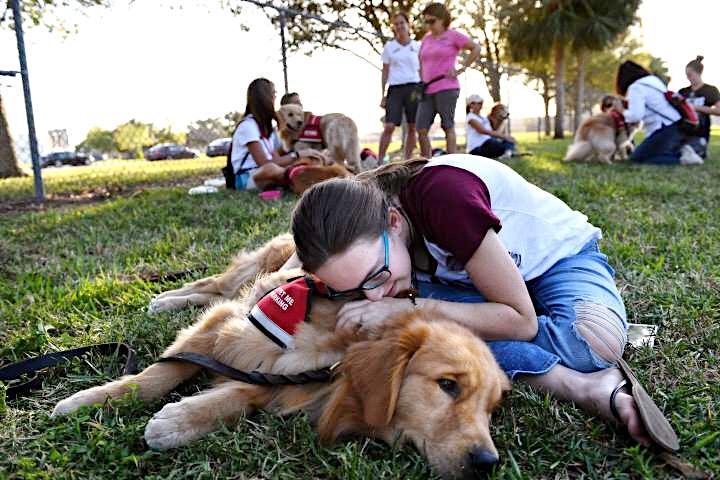Students student at Llanishen High School in Cardiff welcomed a new visitor, a therapy dog, who helps students manage their stress.

As an “experienced” therapy dog, Doug seems to have an ability to make people relax and trust him easily. In the nine years, he has worked for Pet As Therapy (PAT), he has cured many people and captured the hearts of many fans.
“A student at Llanishen High School in Cardiff had been awake all night, sick with worry, because of a coming exam. She sat with Doug and cried like someone bereaved,

“The student was so embarrassed, but Doug wasn’t embarrassed for her. Doug is non-verbal, quiet and restful. He never interrupts or corrects. He enables people to feel empowered and that their voice was worthy to hear,” said Cate, the owner of Doug.
As an official therapy dog, Doug’s job is to accompany students in their spare time, which allow students to improve their mood by touching and petting it, distracting them from the worries of study and life.
The companionship of animals enables people to feel more in control and able to follow through thought processes. “He came into our English class and sat on my lap. When I touched and hugged him, he helped me improve my mood and calmed me down,” said Klaudia, another student at Llanishen High School.

Therapy pets service is quite common in Britain. According to the data from PAT, there are nearly 8,000 dogs and nearly 100 cats working in the UK.
“Being with a companion animal, when invested in the human-animal bond, could lower blood pressure, suppress the production of the stress hormone cortisol, and stimulate the production of the feel-good hormone oxytocin,” Cate explained.
Animal therapy is helpful for students to release stress and keep mentally healthy. However, some experts believe that the effect of therapy pets service for people just lasts in an immediate period.

According to a study in 2018 analysed the impact of a therapy dog session on students at the University of British Columbia, the programme benefits students’ well-being and manages stress on students. But these effects would diminish over time.
It means that it may be useful during particularly stressful times, such as during exams or when students are completing homework. However, students need more effective approaches that can fundamentally help them to manage their emotions.
Stiffelman, a psychotherapist, believes that students who get stressed can release their pressure by ingesting healthy and harmless foods, ensuring adequate sleep time, having proper rest during the learning process and socialising with friends.

“Students have to give their body a way to cope with stress, integrating right-brain activity into their daily life, allowing them to digest and process what they experience by themselves,” said Stiffelman.

